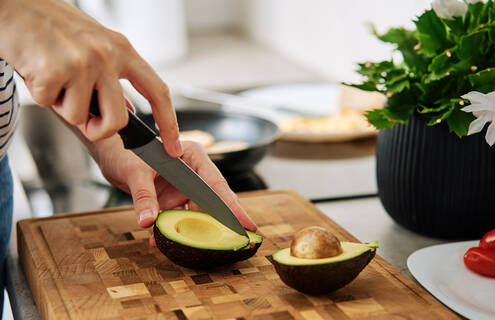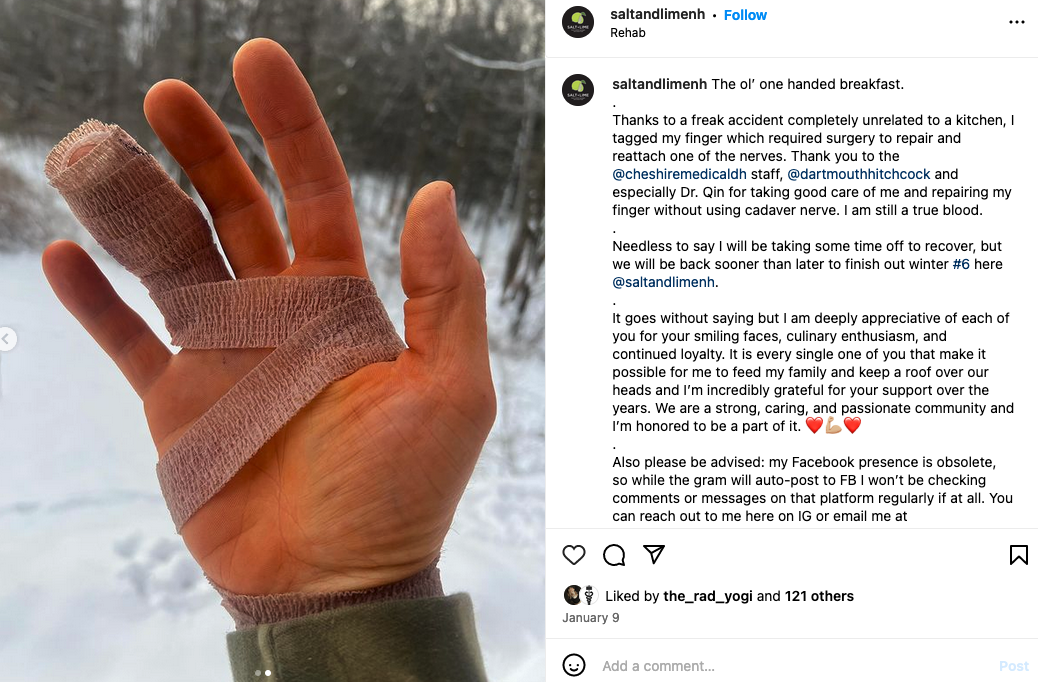
We want to maximize your hand function for a better quality of life.
Sara Hamilton, OT/L, CHTThey say you never know what you have until it’s gone. Anyone who has ever injured one of their hands or fingers can definitely relate to that.
Isaac Kaufman, the chef and owner of the popular Keene-based Salt & Lime food truck, was reminded of that lesson recently when he sliced his right ring finger while reaching into his pocket one night to retrieve his pocket knife. It was a case of “trying to do too many things at once,” he says.
As someone whose entire business relies on his ability to use his hands to create his famous street treats, the injury was significant and required immediate attention. After going to the Emergency Department, Kaufman underwent surgery by Cheshire Orthopaedic surgeon Mia Qin, MD, to repair and reattach one of the nerves in his finger.
“Thanks to a freak accident completely unrelated to a kitchen, I tagged my finger, which required surgery to repair and reattach one of the nerves,” Kaufman wrote on his Instagram page (see post at the bottom of this story). “Thank you to the @cheshiremedicaldh staff, and especially Dr. Qin, for taking good care of me and repairing my finger without using a cadaver nerve.”
How hand lacerations happen
Qin — a hand and arm specialist — estimates that of all of the surgeries she performs, roughly 15 to 20% are the result of acute injuries, as opposed to more chronic conditions such as carpal tunnel, trigger finger, or arthritis. And of all the hand lacerations she treats, she guesses that almost half of them stem from someone who cut themselves trying to slice an avocado.
“Basically, anything that you're holding with your hand that then you're cutting into, such as an avocado, is a risk for a hand laceration,” Qin says. “With an avocado, they're trying to get the pit out, and the knife slips. I've seen injuries happen while people try to slice bagels, hard melons, and squash. And often, they're using a dull knife, so they have to use more pressure, the knife slips, and they cut themselves.”
Preventing hand injuries
The good news is there are simple dos and don’ts we can do every day to keep our hands healthy, say Cheshire Outpatient Occupational Therapists Mollie Bedaw, OT, and Sara Hamilton, OT/L, CHT.
“We want to maximize your hand function for a better quality of life,” Hamilton says.
Do
- When cutting a round object (such as an avocado or bagel), always place the item on a flat cutting surface — do NOT hold it in your hand — and cut away from your body.
- Use the correct cutting utensils for each job, such as kitchen shears for cutting bones or peeling tools for peeling potatoes, and keep them sharp. Dull tools are more likely to cause slips and are still sharp enough to cause an injury.
- When cleaning, use a long-handled sponge, wand, or bottle cleaner to clean fragile glasses, especially wine glasses.
- Wear gloves when working in extreme temperatures (hot or cold), such as in a freezer.
- Wear appropriate gloves for the given task, such as gardening gloves when working in the garden.
- Take preventative measures to decrease repetitive stress on your tendons when using a tablet, phone, or computer. Limit usage to 1 hour.
- If you have a nerve injury (such as carpal tunnel, cubital tunnel, or otherwise), always test hot surfaces or water with the other hand or non-affected fingers.
Don't
- Don't put your hands inside your recycling containers, garbage disposal, snowblower, wood splitter, etc.
- Don't cut fruit in your palm. Instead, place the fruit on a flat surface and cut it away from your hand.
- Don't wrap dog leashes around your fingers or wrist when taking your dog for a walk, as injuries can happen if the dog unexpectedly takes off and strains the leash.
- Don't wash aluminum cans — especially cat food cans — with your fingers. The sharp edge of the can will be very sharp after you open it, so use a sponge or other tool to wash them.
- Don't play games with knives or other sharp objects.
- Don't punch hard, stationary objects such as doors, poles, or walls out of frustration. These short-term acts can have long-term consequences, such as broken bones.
'Practice, perfect, and preserve'
For Kaufman — and other people who work with knives every day — the threat of hand injuries is part of the job. But he does his best to mitigate the risk.
“The best thing you can do is practice, perfect, and preserve your skills with a knife, and keep your knives as sharp as possible,” says Kaufman, who used Cheshire’s Occupational Therapy services to rehab after his surgery. ”You will get cut, but as time passes, it happens less and less frequently.
If you're experiencing pain, numbness, lack of movement, and/or discomfort in your hands, schedule a consult with Orthopaedics or your primary care provider today.
